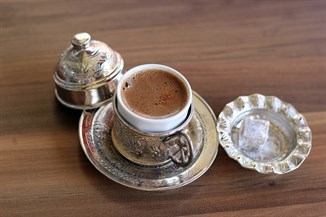Nonverbal Communication: Arabic Coffee Drinking Habits
Nonverbal communication can be just as important as verbal communication in many cultures. Certain customs like handshakes and eye contact can have major impacts on cross-cultural relationships, both personal and professional. In this blog, I will discuss Arabic coffee drinking habits.
Coffee is a common drink most of us cannot start our day without. For me, I need coffee to remain alert throughout the entire day and I need it to be made in the traditional Arabic way, using a small copper stove.

However, in many Arab countries drinking coffee is not simply a caffeine boost. In my journeys to Sudan, Sinai and GCC countries, I discovered the fascinating habits of coffee drinkers and what they can tell you about your host, for example: when he wants you to stay longer or when it’s time to leave!
Origins of Coffee
The word “coffee” originally came from the word “Qahhwwa” in Arabic. The earliest credible evidence of coffee drinking in Arab countries was recorded in the middle of the 15th century in Yemen. It was in Yemen that coffee seeds were first roasted and brewed in a similar way to how it is prepared today.
Coffee seeds were first exported from Eastern Africa (Ethiopia) to Yemen and the coffee plant is thought to have been indigenous to Eastern Africa. Yemeni traders took coffee back to their homeland and began to cultivate the seeds. By the 16th century, it had reached the rest of the Middle East and Northern Africa. It then spread to Europe and the rest of the world.
Ordering Arabic Coffee
Offering coffee as a drink for your guests is considered a symbol of the generosity of Arabs. It is considered a masculine habit and each of the main Arab cities have their own specific type of coffee. They add certain ingredients (cardamom, cloves, ginger, saffron, etc.), which leave a unique experience.
Introducing Arabic Coffee Habits
For the host:
- You must serve it to your guest while you are standing.
- Start on the right side or with the elders in the Majlis (a place of sitting used in the context of “council” to describe various types of special gatherings with linguistic or cultural connections to Islamic countries).
- Hold the coffee pot with your left hand and introduce the cup with the right hand.
- Always offer more to whoever finishes his cup, do not wait until they ask for more.
- Do not sit down until everyone finishes.
- Touch the pot and then the cup to draw the guest’s attention to serve him. This applies only for celebrations, not for funerals.
- Gently tap the pot and the cup to draw the guest’s attention when you are serving him.
For a guest:
- Thank your host and take the coffee cup with your right hand.
- If you want more, just leave your cup empty in front of you. If you do not want more, put your hand on top of the cup and your host will understand when he comes to refill. If you do not want more until the end of the session, turn your cup upside down.
- Shake the cup left and right to make it cool faster. In GCC countries, this can mean that you do not want more.
- It’s preferred to take dates with you as a gift for your host to serve with the coffee.
For guests and hosts:
- If the host makes his tour around the Majlis and notices you are there but doesn’t offer you a cup of coffee, this means that you have to leave as your presence is not welcomed in this place.
- If you want to tell your guest that he is welcome and you are happy to host him, offer him more and more shots and do not fill the cup full to the top.
- Arabs do not offer coffee with sugar at funerals.
- If you need something, just leave your coffee and don’t touch your cup and your host will come ask you what you need.
Summary
These are most of the common Arabic coffee drinking habits in Arab countries. However, I am quite sure there are many other interesting habits I didn’t mention. Respecting and understanding the nonverbal communication of the people you are interacting with will help form good relationships with your colleagues or friends around the world.
